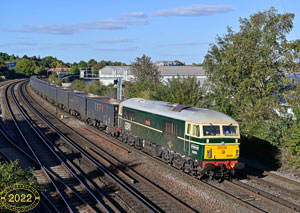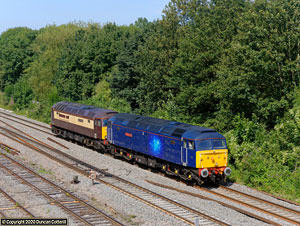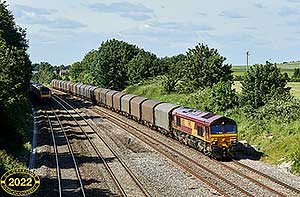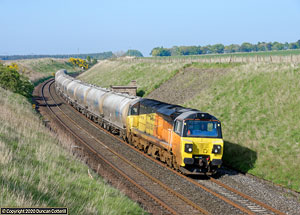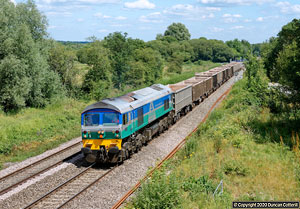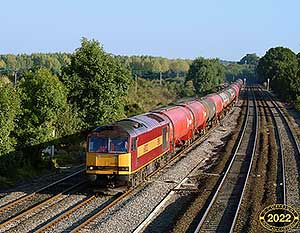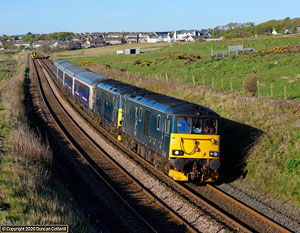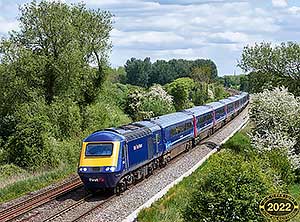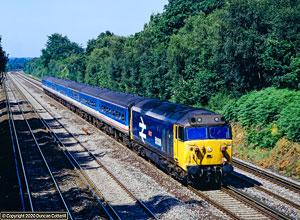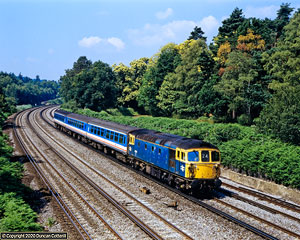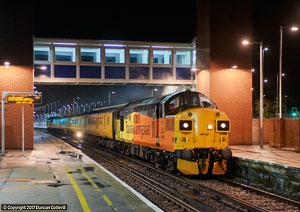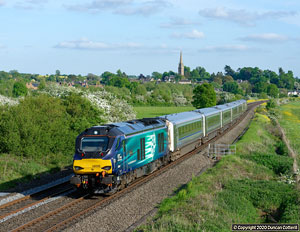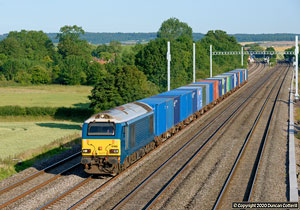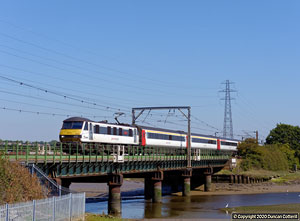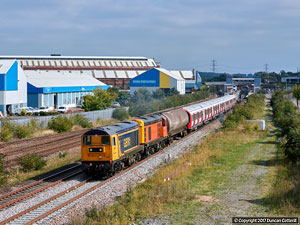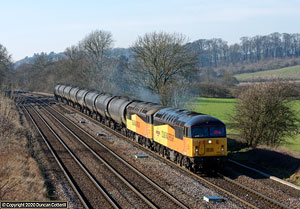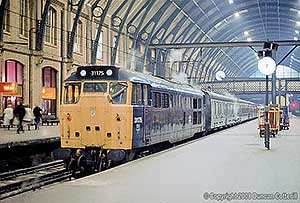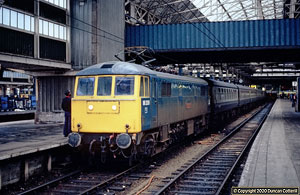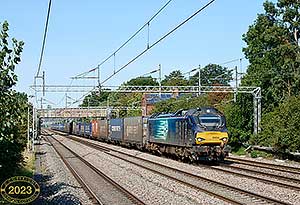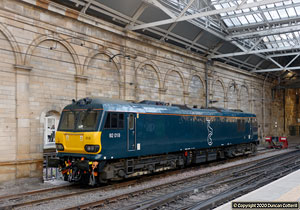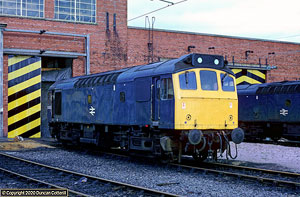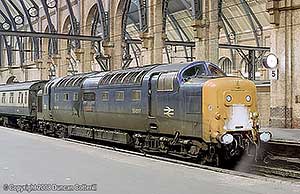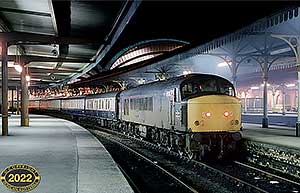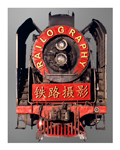Class 69
27 photos
updated : 2024-02-29
The class 69s are BR Class 56 Co-Cos rebuilt with EMD 710 series engines and introduced in 2021. The rebuilds have many components in common with Class 66s and both classes are capable of working in multiple. The class is based at Tonbridge but regularly works freights across much of England.
Class 47, 57
58 photos
updated : 2024-02-29
With 508 locos built from 1962, the Class 47 or Brush Type 4 was Britain's most numerous class of main line diesel loco and could be found on passenger and freight services almost anywhere on the system. Around 30 were rebuilt as Class 57s and a similar number of un-rebuilt locos remain in service.
Class 66
606 photos
updated : 2024-02-29
The GM JT42CWR Co-Co, better known as the Class 66, has been Britain's standard freight diesel for the last 20 years, with almost 500 delivered between 1998 and 2015. They can be seen everywhere from the Scottish Highlands to Cornwall or Kent on all types of freight traffic.
Class 70
80 photos
updated : 2024-02-29
The Class 70 is a 3700hp Co-Co diesel-electric built by GE for Freightliner and Colas between 2008 and 2017. The 17 Colas machines are very active, working departmental and freight trains across the network, in contrast, Freightliner's 20 locos seem underutilised, with several usually in store.
Class 59
270 photos
updated : 2024-02-27
Fifteen 3300hp Class 59 Co-Co diesel-electrics were built between 1986 and 1995. They were unusual at the time in being American built and privately owned. All have worked stone traffic from the Mendip quarries and 14 still do, but now for Freightliner. GBRf owns the 15th loco.
Class 60
79 photos
updated : 2024-02-27
These 3000hp diesel-electric Co-Co heavy freight locos were the last diesel design built for BR and 100 entered service between 1989 and 1993. All passed to EWS and then to DBC. The remaining DB locos are now in store but some were sold and still work heavy freights for GBRf and DCR.
Class 73
40 photos
updated : 2024-02-25
The Class 73 Electro-Diesels were built for the Southern Region in the 1960s and were 750V DC electrics with a small diesel engine to provide power away from the 3rd rail. GBRF retains a small fleet and several of these were rebuilt with more powerful diesels from 2014 for test trains and the Caledonian Sleeper.
Class 43 HSTs
203 photos
updated : 2024-02-21
The Class 43 powered HSTs brought new levels of speed and comfort to several of Britain's main lines in the 1970s. They have lost their highest profile work in recent years but some remain in service today, on passenger work for Scotrail and GWR and on Network Rail test trains.
Class 50
15 photos
updated : 2024-02-03
The English Electric Class 50 2700hp Co-Co diesel-electric was introduced in 1967 for WCML services north of Crewe. They were excellent performers but had some reliability problems. The class migrated to the Western Region in 1974 and remained there until the final examples were withdrawn in 1994.
Class 33
8 photos
updated : 2024-02-03
The BRCW Type 3 Bo-Bo diesel-electric was a useful 1550hp loco designed to meet the requirements of the Southern Region. Over the years their duties took them far from SR metals on passenger and freight workings. Most of the class were withdrawn in the 1990s but a handful are still in service with WCRC.
Class 37
33 photos
updated : 2024-01-28
The Class 37 or English Electric Type 3 1750hp Co-Co diesel-electric was BR's go anywhere, do anything locomotive and arguably the country's most successful diesel design. Several have remained in main line service for over 60 years and the survivors still see regular use with a few operators today.
Class 68
12 photos
updated : 2024-01-28
The 34 Class 68 3800hp Bo-Bo diesel-electrics were built between 2013 and 2017 by Vossloh, later Stadler, and are all in service with DRS. As well as working DRS freight trains, a number of Class 68s are sub-leased to Chiltern Railways for passenger work between London and the West Midlands.
Class 67
10 photos
updated : 2024-01-04
The 30 3200hp Class 67 Bo-Bo diesel-electrics were built by Alstom from 1999 for mail trains operated by EWS and had the same GM engine and generator as the class 66. After the mail contract was lost in 2003, they have been used for many different types of traffic with several in store and a couple sold.
Class 90
24 photos
updated : 2023-10-19
The fifty Class 90 25kV Bo-Bo electrics were the last locos built specifically for the WCML and entered service between 1987 and 1990. Some still worked passenger trains in East Anglia until 2020 but the class is now almost exclusively used in pairs on intermodal trains for Freightliner.
Class 20
7 photos
updated : 2023-08-31
The Class 20 or English Electric Type 1 1000hp Bo-Bo diesel-electric was the first of the 1955 modernisation plans to be built in large numbers. Designed for freight work, they proved very reliable locos and a few still see occasional use, over 60 years after the class was introduced.
Class 56
6 photos
updated : 2023-08-26
The Class 56 3250hp Co-Co was a late 1970s heavy freight design. Most were built at Crewe or Doncaster but the first 30 were subcontracted to Electroputere in Romania. A number remain in service today, with Colas and DCR, while others are being rebuilt as Class 69 for GBRf.
Class 31
14 photos
updated : 2023-05-08
The original Brush Type 2 1365hp A1A-A1A diesel-electrics were troublesome. Re-engining improved reliability but they were still heavy and underpowered. Originally based on the ER, the class spread to most parts of the system by the 1990s. Many finished in that decade but three remained in service until 2015.
Class 86
5 photos
updated : 2023-04-06
The 4000hp 25kV AC Class 86 Bo-Bo was introduced in 1965 for mixed traffic duties on the recently extended electrified section of the WCML. They continued on WCML and later Great Eastern passenger duties until 2004 and worked container trains for Freightliner until early 2021.
Class 88
5 photos
updated : 2023-04-06
The Class 88 is the first of a new family of electro-diesels and bears a close resemblance to the Class 68. DRS has 10 of these 25kV 5400hp electric / 940hp diesel Bo-Bos in service, used primarily on intermodals between Mossend and Daventry, but appearing on other traffic and routes as well.
Class 92
4 photos
updated : 2023-04-06
Brush built 46 Class 92 Co-Co electrics for Channel Tunnel traffic from 1993. Only a few are in use after the traffic they were intended for didn't materialise. DBC and GBRf use 92s in the tunnel and GBRf locos work Caledonian Sleeper services between London and Scotland. Some have been exported.
Class 25
6 photos
updated : 2020-04-22
The Class 25 or BR Type 2 1250hp Bo-Bo diesels were the UK's second largest class, totalling 327 locos, and worked everywhere from northern Scotland to Cornwall. By the early 1980s there was little need for smaller locomotives and the class was progressively withdrawn with the last going in 1987.
Class 55 Deltics
23 photos
updated : 2020-04-20
Without doubt the most remarkable diesels ever to run on BR, the Deltics were faster and more powerful than their contemporaries. After 20 years and millions of miles working 100mph expresses on the ECML, these 3300hp Co-Co diesel-electrics were worn out and withdrawn at the end of 1981.
Class 44, 45, 46
4 photos
updated : 2019-09-25
The Class 44, 45 and 46 "Peaks" were 2300hp or 2500hp 1-Co-Co-1 diesel-electrics built at Derby and Crewe from 1959. Although they operated in many parts of the country they were most closely associated with the Midland Main Line and NE-SW routes. The last Peaks were withdrawn in the late 1980s.
My home country where I've been photographing trains since the late 1970s. Only a small fraction of my British material is online at present but it covers a wide range of loco classes, train types and photo locations, from northern Scotland to the south coast of England and from Deltics to DMUs.
Britain's railways are far less interesting than they were a few decades ago but despite the decline it is still possible to find trains and locations that are worth photographing.




 options
options hide options panel
hide options panel